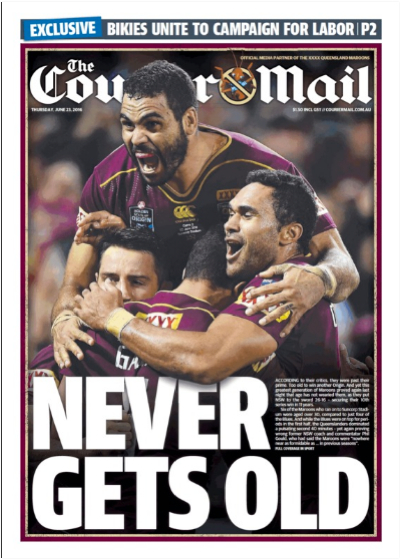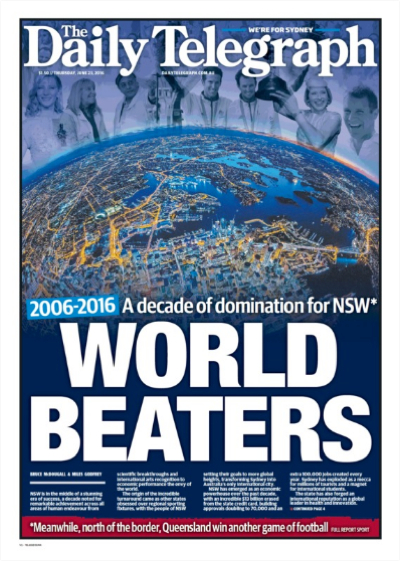The Chief Minister v The Crimes. ACT Chief Minister Andrew Barr told a budget estimate hearings yesterday he had taken “great pleasure” in cancelling his subscription to the Canberra Times yesterday, after having blasted the paper a few days ago as being “a tired old journalism outfit … a decaying forum in terms of readership and interest”.
The verdict came in the middle of a heated debate between Barr and opposition leader Jeremy Hanson, who said there was a “smell” around the 15-year Labor government. Hanson enlisted a series of scandals covered in the Canberra Times to bolster his argument, drawing Barr’s ire to the paper itself.
It’s hardly the first time Barr has attacked the paper, which has been doggedly pursuing series of local stories that don’t paint his government in flattering light. Canberra insiders say Barr’s views towards the paper are well known — he regularly criticises it in doorstop interviews, even when reporters from The Canberra Times are present. And he’s given regular interviews to Canberra’s broadcast outlets, but not to the paper.
What’s so startling about recent developments is that Canberra is, when it comes to local reporting, a one-paper town. Reporters at rival outlets say the paper has a history of getting drops and advance briefings from the government, and it’s understood it still maintains good relationships with others in Barr’s administration.
Asked to comment on Barr’s characterisation of the paper as a “tired old outfit … a decaying forum” etc., a Fairfax spokesperson said: “When politicians attack quality journalism like ours, it generally means we are doing our job right.” — Myriam Robin
The silver lining. The Queensland Maroons have added another State of Origin win to their tally, cementing a decade of origin success after smashing the Blues 26-16 last night for their 10th win in 11 years.
The games always give the local tabloids a chance to play to the home crowd. Needless to say the Courier-Mail had plenty to cheer for …

But the Daily Telegraph found a silver lining. Its front-page splash today lauds its “decade of domination” in “all areas of human endeavour from scientific breakthroughs and international arts recognition to economic performance the envy of the world”.
A note at the bottom notes that “meanwhile, north of the border, Queensland win another game of football” …

C-SPAN turns to Periscope. American news network C-SPAN, which broadcasts Congressional proceedings live, was shut out of the debate on gun control measures in the House when Democrats organised a sit-in and Republican Ted Poe called a recess, which meant the House cameras were shut off. But the network was not to be stymied, The Huffington Post reports:
“Undeterred, the network switched to footage broadcast by Rep. Scott Peters (D-Calif.) via Periscope, a smartphone app that allows anyone to live stream video of their surroundings.
Periscope quickly created a channel dedicated to the event, allowing its users to easily access the footage …
But minutes later, the Periscope feed ended and C-SPAN actually did shift to Facebook Live:
Howard Mortman, head of communications at C-SPAN, told The Huffington Post that this is the first time the network has used live streaming apps like this.
“‘We’ve incorporated Periscope into our coverage of past events, but not [like] this,’ Mortman told HuffPost.”
Bail-out looms. The Canadian Government of Prime Minister Justin Trudeau is edging closer to bailing out the country’s print media as the sector, especially the English language outlets, staggers under the weight of falling revenues, advertising, the assault from social media, led by Facebook,and stupid, greedy management. A series of newspaper closures, trading losses, asset impairments, rising debts and mass sackings by some media groups so far in 2016 seems to have brought the sector’s problems to a head.
Now the Canadian government has asked a body known as the independent Public Policy Forum to assess the state of Canada’s struggling news industry as it mulls over potential policy options. This will be based around three questions: does the deteriorating state of traditional media put at risk the civic function of journalism and thus the health of democracy? If so, are new digitally based news media filling the gap? If not, is there a role for public policy to help maintain a healthy flow of news and information, and how could it be done least intrusively?
The looming 2017 deadline for the cost-cutting and refinancing of Postmedia — Canada’s biggest publisher — has given the review a deadline. Talks start next week in a series of roundtables to discuss the problems. It’s not that the Canadian-owned media hasn’t already been helped by government policy. In 1965 the company’s tax laws were changed to give advertisers in Canadian-owned media more favourable benefits than those advertising in foreign-owned media coming into Canada (read American). There have been several royal commissions and major government studies on the news media, and pay TV content rules have been changed to favour Canadian made material ahead of programming originating outside the country (again, read, American). — Glenn Dyer
AFR embraces recycling. The Australian Financial Review has long made clear its disdain for all things Green, yet this morning’s front page includes recycled arguments on the government’s tax cuts that were first aired in The Australian two weeks ago.
Here is what the AFR reported today:
“The Coalition’s planned corporate tax cut would deliver consumers one of the largest pay-offs imaginable from a government decision, according to research commissioned by Treasury.
“For every $1 lost in tax revenue from cutting the 30per cent corporate rate, about $2.39 would be returned through’consumer welfare’, argues economist Chris Murphy.”
And what appeared in The Australian on page 1 on June 8?
“Australia stands to gain a ‘consumer benefit’ worth more than twice the value of the federal government’s $48.2 billion company tax cut under a new analysis that counters Labor’s growing criticism of the potential boost.
The Treasurer will assure Australians that the long-term economic gains will be as much as $2.39 for every $1 in the tax burden eased on business, as he also goes on the attack over Bill Shorten’s ‘hypocrisy’ in rejecting tax cuts he endorsed only five years ago.
“The new research by Independent Economics director Chris Murphy counters criticism of the government plan from the Grattan Institute, the Australia Institute, Labor and the Greens over the scale of the benefits, igniting a new dispute over a policy at the heart of Malcolm Turnbull’s election campaign.
Well fancy that, the same argument recycled in the AFR, 15 days later. I know arguments in favour of the corporate tax cut are scarce, but this is absurd for a paper claiming to be the country’s premier business newspaper. Surely they could have found someone else, or commissioned their own modelling, but recycling? And the AFR had the hide to claim its story this morning as an “Exclusive”. — Glenn Dyer
Video of the day. A role like no other. Max Gillies stars as Rupert Murdoch in the latest campaign ad from ABC Friends …








The Gillies video is a treat. And so close to the bone.